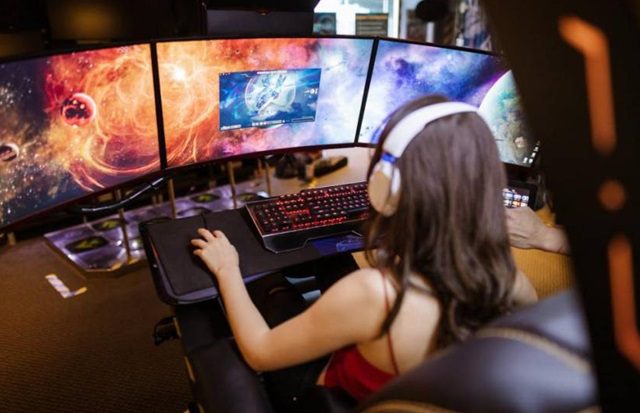BTN News: In the heart of Riyadh, Saudi Arabia, the streets have become a sea of enthusiastic fans, eagerly celebrating a new chapter in the nation’s grand vision: the inaugural Esports World Cup. Amidst the searing 43-degree heat, cooling mists refresh the crowd, and a towering 9-meter replica of a golden trophy stands as a beacon of the country’s burgeoning influence in the global gaming arena. This event is not just a tournament; it represents the Kingdom’s bold stride into the multi-billion-dollar gaming industry, a sector Saudi Arabia is ambitiously aiming to dominate as part of its broader strategy to diversify its economy away from oil dependence.
With a staggering $60 million prize pool, the Esports World Cup spans eight weeks of fierce competition, marking a significant milestone in Saudi Arabia’s quest to become a global powerhouse in the gaming industry. This effort is underscored by the government’s commitment to invest $38 billion into the video game industry by 2030, a move spearheaded by the Public Investment Fund (PIF), the Kingdom’s colossal sovereign wealth fund with assets of $700 billion. This massive financial commitment is part of Crown Prince Mohammed bin Salman’s Vision 2030 plan, which seeks to diversify the economy and transform Saudi Arabia into a hub of innovation and entertainment.
Saudi Arabia’s influence in the gaming world is expanding rapidly and is no longer confined within its borders. Amidst a challenging year for the gaming industry, marked by significant layoffs and financial turbulence, the Kingdom’s wealth has become a lifeline for many of the world’s leading gaming companies. Through the PIF, Saudi Arabia has quietly but steadily increased its stake in the global gaming industry, with substantial investments in some of the biggest names in gaming and esports. The PIF’s gaming subsidiary, Savvy Games Group, now controls 40% of the global esports market, a testament to the Kingdom’s determination to reshape the future of competitive gaming.
Savvy Games Group, backed by the PIF, has spent approximately $6 billion acquiring gaming companies and another $14 billion on stock investments. This aggressive expansion strategy has raised eyebrows and sparked debates within the global gaming community. Critics argue that Saudi Arabia’s deep pockets are being used to gloss over the country’s controversial human rights record, a tactic that has also been employed in other areas like professional golf and football. Despite this, the pervasive influence of Saudi money in the esports world is becoming increasingly difficult to avoid.
For some within the gaming industry, the Kingdom’s financial power presents a moral dilemma. Esports commentator Parker Mackay, for instance, stepped down from a prestigious awards panel in protest after it partnered with a Saudi-backed organization. He noted that avoiding Saudi involvement is becoming nearly impossible for those seeking to advance their careers in esports, given the Kingdom’s growing dominance in the industry. This sentiment is shared by others who are grappling with the ethical implications of accepting Saudi investment, yet the reality remains that Saudi Arabia’s presence in gaming is now a force to be reckoned with.
Looking beyond individual events and partnerships, Saudi Arabia’s ambitions in gaming extend to grander projects. The Kingdom is in the process of constructing Qiddiya, a futuristic gaming city complete with its own esports district, located about 50 kilometers west of Riyadh. This ambitious project is part of a broader strategy to position Saudi Arabia as a global center for gaming and entertainment. The Kingdom has also forged alliances with major industry players such as Sony and Microsoft’s Activision Blizzard, as well as media giants like Rolling Stone and CNN, further cementing its influence on the global stage.
The rapid rise of Saudi Arabia in the gaming world is a reflection of Crown Prince Mohammed bin Salman’s personal passion for video games and his broader vision for the Kingdom’s future. The PIF’s investment portfolio includes stakes of $3.4 billion in Electronic Arts, $1.7 billion in Take-Two Interactive, and $5.2 billion in Nintendo, making it the largest external shareholder in the Japanese gaming giant. These investments, along with the PIF’s earlier $3.3 billion stake in Activision Blizzard before its acquisition by Microsoft, underscore the Kingdom’s strategic positioning within the global gaming market.
In 2021, the PIF established Savvy Games Group to lead its ambitious $38 billion gaming investment plan. To steer this initiative, the fund appointed Brian Ward, a former executive at Electronic Arts and Activision Blizzard, as CEO. Under Ward’s leadership, Savvy Games Group is spearheading efforts to create 250 gaming companies and 39,000 new jobs within Saudi Arabia, while also attracting top talent from the United States and Asia to contribute to the Kingdom’s growing gaming ecosystem.
As Saudi Arabia continues to pour its vast resources into the gaming industry, it is also fostering a new generation of local developers and esports athletes, aiming to build a sustainable and thriving gaming culture within the country. Some esports teams, like Team Liquid, are navigating this complex landscape by balancing their acceptance of Saudi investment with efforts to promote social causes, such as LGBTQ+ inclusion, within the sport.
In summary, Saudi Arabia’s meteoric rise in the gaming and esports industry is a testament to its ambitious economic diversification strategy and its determination to become a global leader in the entertainment sector. As the Kingdom continues to invest billions into gaming, it is reshaping the industry and forcing the global gaming community to confront the ethical and financial implications of this new reality. The future of esports and gaming is being rewritten, with Saudi Arabia playing a central role in this evolving narrative.


